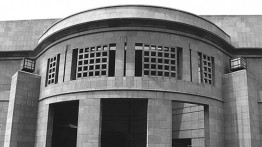Soviet Asia, Iran, and India as Relief Sites for European Jews during World War II
POSTED ON: February 9, 2012

United States Holocaust Memorial Museum
Cooper Union Professor of History Atina Grossmann is the 2011–2012 Diane and Howard Wohl Fellow at the United States Holocaust Memorial Museum in Washington, D.C. Professor Grossmann is conducting research on a long-neglected topic that is central to the history of the Holocaust: the World War II Jewish refugee experience in the Soviet Union, especially Central Asia -- where in fact most of the small remnant of Polish Jewry that survived the war found a harsh refuge. Her research also focuses on the relief and rescue efforts centered in Iran and India that worked to keep these European Jews alive. Her research on these "transnational Jewish Refugee Stories" also explores the marginalization of this "Asiatic" Holocaust experience in both historiography and memory culture, its inscriptions and omissions in cultural memory during and after the war, as well as its potential role in the more recent and highly politicized “globalization” of Holocaust memory, in both the western and nonwestern world.
Utilizing the Museum’s records of the International Tracing Service as well as archives from organizations like the JOINT Distribution Committee and Bombay Jewish Relief Organization, private family collections, oral histories, film and photographic sources, and memoirs, Professor Grossmann hopes to produce what she describes as a hybrid history "relevant to a general as well as scholarly audience—synthesizing all these sources with her own personal family archive about her parents' refugee experience in Iran and India in the 1930s and 1940s.
In addition to her research fellowship, Professor Grossmann will be a seminar leader in the 2012 Curt C. and Else Silberman Seminar at the Center for Advanced Holocaust Studies at the Holocaust Memorial Museum. The seminar, which takes place in June, is designed for college professors who seek to begin or expand their course offerings in Holocaust studies and will this year focus on gendered aspects of Holocaust experience. Exploring the points of convergence and divergence between male and female experience as they relate to writing and teaching about the Holocaust, the seminar will address a range of topics such as early persecution, refugee life, concentration camp life, life in hiding, separation and reunion of families, and survival in the postwar era.
Professor Grossmann is also participating in the USHMM's public outreach program which currently focuses on issues of immigration. In April she will lecture and meet with students and faculty at New Mexico State University in Las Cruces and Texas A&M University in College Station, TX, bringing her scholarship on refugee and immigration politics during World War II, the Holocaust, and the immediate postwar years to institutions grappling with the contemporary politics of borders, immigration, and undocumented immigrants.
Read more about Professor Grossmann’s research on the Holocaust Memorial Museum website.




